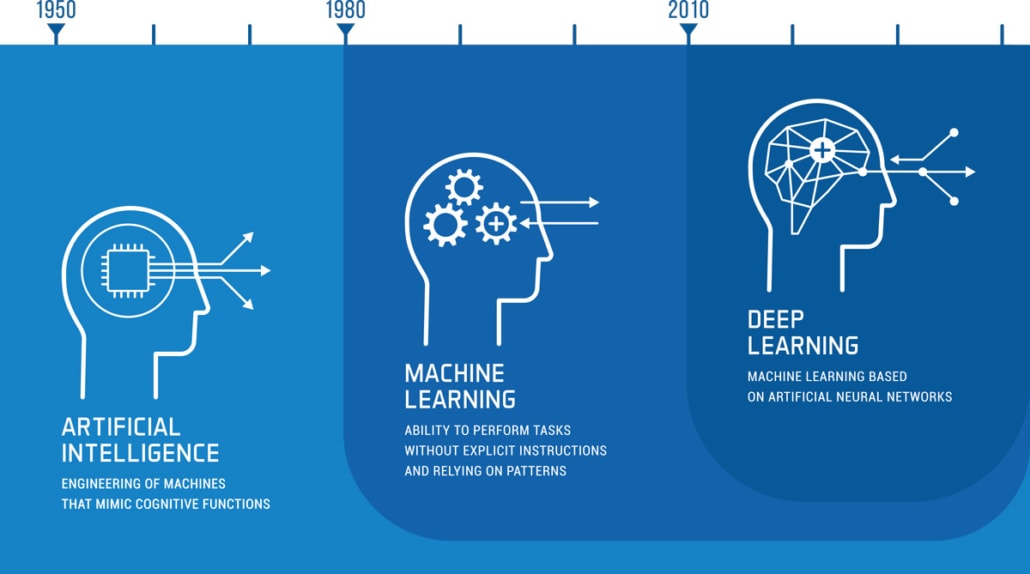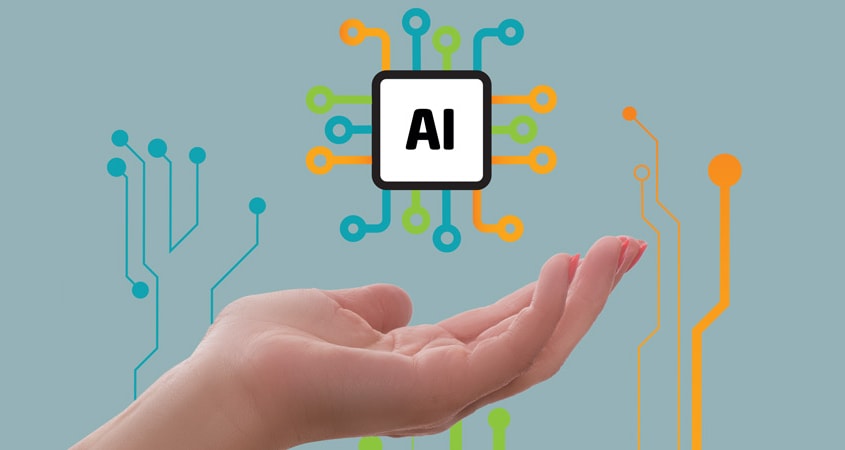The age of AI: the Future’s in your hands!
The future is right now! Dive into the the world of artificial intelligence (AI) and find out how it’s revolutionizing the IT landscape. In this article we explore how AI is relevant, and why expert knowledge in a variety of specializations is the key to success.
The meteoric growth of artificial intelligence (AI) has turned our world around and permanently changed the IT industry. In an era in which data has become our most valuable currency, AI is the very heart of our digital transformation. It’s pushing forward innovations at an unprecedented pace and making it possible for companies to increase efficiency, understand their customers better and develop groundbreaking solutions.
Development of AI

In recent decades, artificial intelligence (AI) has experienced significant advances in development which have fundamentally changed the way we see technology and business processes. AI’s early years (from the 1950s to 1970s) focused on symbolic AI where rules and symbols were used to simulate human intelligence. This led to the development of expert systems which had the ability to use specialized knowledge, specified in the form of rules.
The next phase, known as the “AI winter” (from the 1980s to the early 2000s) were marked by disappointments and financial setbacks, as the high expectations of AI were not being met and many projects were suspended.
The revival of AI began in the late 2000s, as advances in machine learning and the availability of huge volumes of data opened up new possibilities for the technology. Machine learning made possible algorithms which recognize patterns in data and develop models automatically. In particular, deep learning with neural networks led to groundbreaking advances in fields such as image recognition, natural language processing and autonomous driving.
Recent decades have seen the integration of AI technologies in a wide range of applications, ranging from personalized recommendation systems in social media all the way up to medical diagnosis and autonomous driving. In addition, ethics and governance in relation to AI has became increasingly important, since the technology has raised issues related to data protection, bias and responsibility. Finally, the development of autonomous systems such as self-driving cars and drones has fundamentally changed industries such as transportation and logistics.
All in all, AI has grown from a theoretical concept into a practical reality which has profoundly influenced our lifestyles as well as well as the way we do business. Focus has shifted from symbolic AI to data-driven approaches like machine learning, which in turn has led to significant advances in the performance capabilities and applicability of AI technologies.
The AI revolution: Where are we today?
Today, even mainstream users have access to a wide number of technologies such as large language models (LLM) and image generators, and AI is a hot topic in the media. AI’s areas of application have never been more diverse. For example, it’s used in healthcare to help physicians diagnose complex diseases. And in the automobile industry, it’s working to bring self-driving cars to the road. The ethical and societal repercussions of AI are currently the subject of intense debate, and the way in which we address these issues will have a significant impact on our future.
AI is more than just a technological innovation – it’s changing the way we live and work, and presenting us with challenges that we must overcome together.
Karl Schott, Gründer & CEO
Importance of specialist knowledge
Multi-disciplinary teams which bring a wide variety of qualifications play a crucial role in determining whether or not a company uses AI successfully. Such diversity makes it possible for a company to consider AI applications from different perspectives and to develop interdisciplinary approaches to finding solutions. AI projects require expertise in a wide range of fields, including data analysis, machine learning, software development, ethics, design, project management and domain expertise. A multi-disciplinary team has the ability to better manage this diversity and to tackle a variety of challenges, from data collection and processing through model development and ethical assessment all the way up to implementation.
And since customer orientation is also of great importance, a diversified team has the ability to better empathize with the needs and expectations of the company’s customers and can develop AI applications which are truly of value. In addition, ethical and legal experts can see to it that the company’s AI applications meet ethical standards and legal requirements.
A team of this nature should be well-founded on solid technical qualifications such as data science and machine learning, software development, expert domain knowledge, ethics and governance, UX/UI design, project management, communication skills and last but not least a touch of creativity.
And for management, it’s essential that they’re aware not just of the opportunities afforded by AI but also how it works, so that the company uses the tools which are the right ones for its success and trains its employees accordingly. In addition, it’s always more relevant when making strategic, data-based decisions to be able to correctly interpret the corresponding data and decision processes.
The key: Up-to-date qualifications
The key to taking full advantage of this historic technological change is ongoing training which ensures that not only your company’s employees but you as well always have the right qualifications. That’s exactly where our current training program comes in.
We provide expert, proven, state-of-the-art knowledge in specialty areas of technical development which will reinforce your technical skill set. This is essential, since a solid technical foundation is a crucial starting point for managing innovation. At the same time, our newly designed innovation courses which focus on AI will ensure you apply your know-how in line with what’s happening right now.
Put together your own personal program of training to make optimal use of the possibilities provided by modern technologies. Now’s the perfect time to take charge – proactively shape your professional future by taking advantage of the opportunities afforded by AI!









